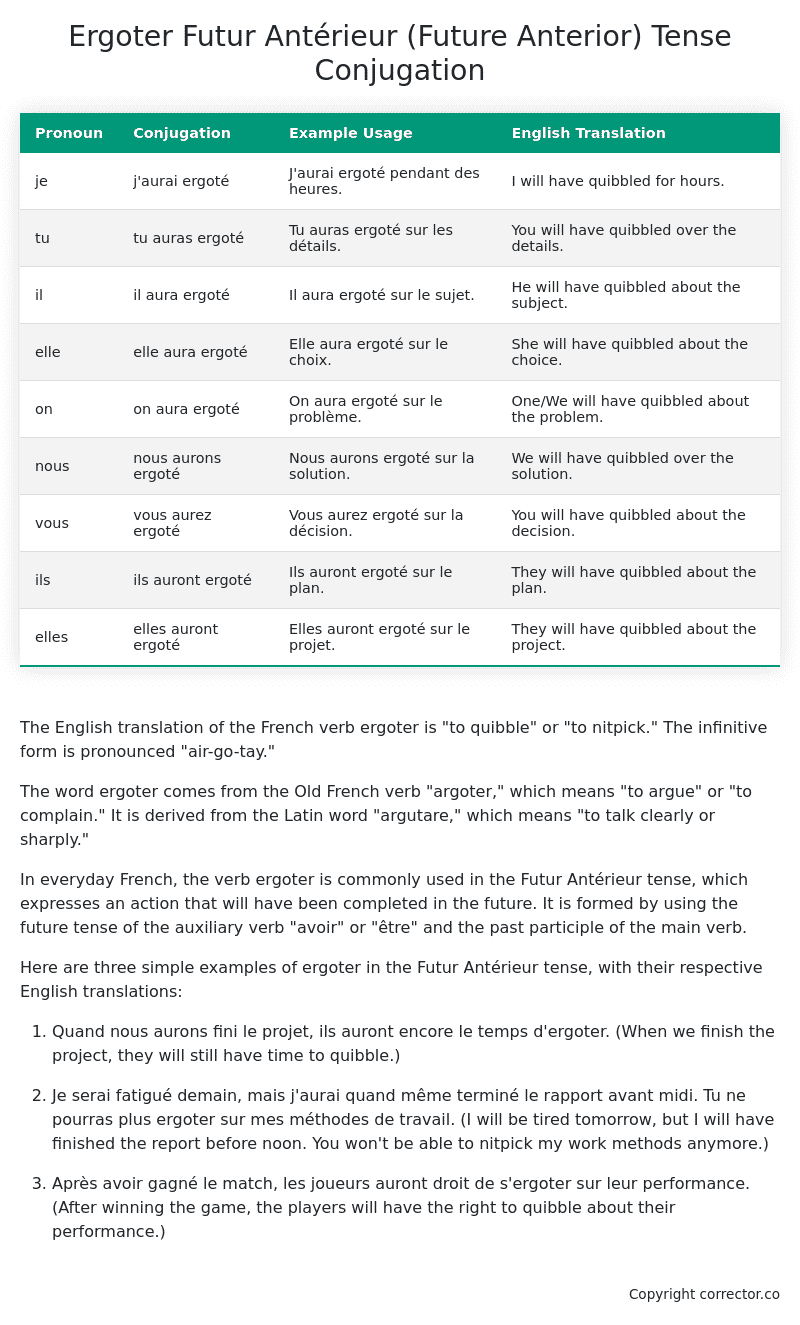Futur Antérieur (Future Anterior) Tense Conjugation of the French Verb ergoter
Introduction to the verb ergoter
The English translation of the French verb ergoter is “to quibble” or “to nitpick.” The infinitive form is pronounced “air-go-tay.”
The word ergoter comes from the Old French verb “argoter,” which means “to argue” or “to complain.” It is derived from the Latin word “argutare,” which means “to talk clearly or sharply.”
In everyday French, the verb ergoter is commonly used in the Futur Antérieur tense, which expresses an action that will have been completed in the future. It is formed by using the future tense of the auxiliary verb “avoir” or “être” and the past participle of the main verb.
Here are three simple examples of ergoter in the Futur Antérieur tense, with their respective English translations:
-
Quand nous aurons fini le projet, ils auront encore le temps d’ergoter. (When we finish the project, they will still have time to quibble.)
-
Je serai fatigué demain, mais j’aurai quand même terminé le rapport avant midi. Tu ne pourras plus ergoter sur mes méthodes de travail. (I will be tired tomorrow, but I will have finished the report before noon. You won’t be able to nitpick my work methods anymore.)
-
Après avoir gagné le match, les joueurs auront droit de s’ergoter sur leur performance. (After winning the game, the players will have the right to quibble about their performance.)
Table of the Futur Antérieur (Future Anterior) Tense Conjugation of ergoter
| Pronoun | Conjugation | Example Usage | English Translation |
|---|---|---|---|
| je | j’aurai ergoté | J’aurai ergoté pendant des heures. | I will have quibbled for hours. |
| tu | tu auras ergoté | Tu auras ergoté sur les détails. | You will have quibbled over the details. |
| il | il aura ergoté | Il aura ergoté sur le sujet. | He will have quibbled about the subject. |
| elle | elle aura ergoté | Elle aura ergoté sur le choix. | She will have quibbled about the choice. |
| on | on aura ergoté | On aura ergoté sur le problème. | One/We will have quibbled about the problem. |
| nous | nous aurons ergoté | Nous aurons ergoté sur la solution. | We will have quibbled over the solution. |
| vous | vous aurez ergoté | Vous aurez ergoté sur la décision. | You will have quibbled about the decision. |
| ils | ils auront ergoté | Ils auront ergoté sur le plan. | They will have quibbled about the plan. |
| elles | elles auront ergoté | Elles auront ergoté sur le projet. | They will have quibbled about the project. |
Other Conjugations for Ergoter.
Le Present (Present Tense) Conjugation of the French Verb ergoter
Imparfait (Imperfect) Tense Conjugation of the French Verb ergoter
Passé Simple (Simple Past) Tense Conjugation of the French Verb ergoter
Passé Composé (Present Perfect) Tense Conjugation of the French Verb ergoter
Futur Simple (Simple Future) Tense Conjugation of the French Verb ergoter
Futur Proche (Near Future) Tense Conjugation of the French Verb ergoter
Plus-que-parfait (Pluperfect) Tense Conjugation of the French Verb ergoter
Passé Antérieur (Past Anterior) Tense Conjugation of the French Verb ergoter
Futur Antérieur (Future Anterior) Tense Conjugation of the French Verb ergoter (this article)
Subjonctif Présent (Subjunctive Present) Tense Conjugation of the French Verb ergoter
Subjonctif Passé (Subjunctive Past) Tense Conjugation of the French Verb ergoter
Subjonctif Imparfait (Subjunctive Imperfect) Tense Conjugation of the French Verb ergoter
Subjonctif Plus-que-parfait (Subjunctive Pluperfect) Tense Conjugation of the French Verb ergoter
Conditionnel Présent (Conditional Present) Tense Conjugation of the French Verb ergoter
Conditionnel Passé (Conditional Past) Tense Conjugation of the French Verb ergoter
L’impératif Présent (Imperative Present) Tense Conjugation of the French Verb ergoter
L’infinitif Présent (Infinitive Present) Tense Conjugation of the French Verb ergoter
Struggling with French verbs or the language in general? Why not use our free French Grammar Checker – no registration required!
Get a FREE Download Study Sheet of this Conjugation 🔥
Simply right click the image below, click “save image” and get your free reference for the ergoter Futur Antérieur tense conjugation!

Ergoter – About the French Futur Antérieur (Future Anterior) Tense
Construction
Common Everyday Usage Patterns
Interactions with Other Tenses
For example
Summary
I hope you enjoyed this article on the verb ergoter. Still in a learning mood? Check out another TOTALLY random French verb conjugation!


